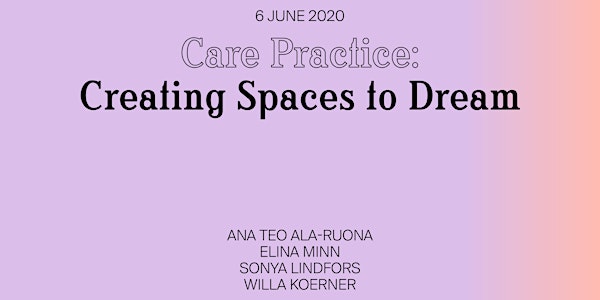
Care Practice: Creating Spaces to Dream
Date and time
Location
Online
Description
The new, free online public program Care Practice: Recipes for Resilience pairs visionary creative practitioners from the United States, Finland and Sámi to imagine future forms of care and resilience in relation to their communities and the COVID-19 crisis.
Saturday, June 6: Creating Spaces to Dream
Time: 10am PST / 1pm EST / 8pm EEST
Duration: 2 hours
The event will take place virtually on Zoom
[Link will be distributed to RSVPs 10 minutes before the program begins]
Free of charge, RSVP required
[This event is free, but in lieu of a ticket, we request that you make a donation to community bail out funds, mutual aid organizations and racial justice organizers across the United States.]
Accessibility information: Closed Caption text transcription is available via Zoom, all sessions held in English
In advance of Saturday's program, we suggest that you read Audre Lorde's short text "The Transformation of Silence into Language and Action." PDF here. As a group, we will be reflecting on this text during the discussion.
Warm-Up: Embodied writing exercises led by Ana Teo Ala-Ruona and Elina Minn
Discussion: Sonya Lindfors and Willa Koerner
Organized weekly throughout June 2020, the four Care Practice sessions will consist of multi-sensory, participatory exercises, followed by intimate conversation-led sessions moderated by the guest presenters. The final session is a workshop that envisions future structures of care given the immense and urgent uncertainty of the present. The project is organized by the LA-based Gas Gallery and coordinated by curators Ceci Moss (Los Angeles) and Jenni Nurmenniemi (Helsinki). It is supported by the Finnish Cultural and Academic Institutes’ Together Alone initiative.
Braver Space Community Agreement
The organizers of Care Practice strive to create an open and inclusive environment in which participants feel empowered to take risks and engage in challenging discussions. We see the need for safer spaces in all organizing and are committed to it as part of our work. We encourage our attendees to learn how to create such spaces in each of our gatherings and adopt such practice pertinent to their own organizing. Below are some principles that guide our commitment to collective practice:
– Hold ourselves accountable first, and enter each space with a humble heart and loving criticality. Center care in our interactions with others and in representing our own needs.
– In order to grow a common field that is truly intersectional and inclusive, we need to recognize that inequity is systemic. Before entering each organizing space, take a moment to acknowledge our differences and be honest about our own privileges and power. Make a conscious effort to resist ableism, racism, classism, ageism, sexism, homophobia, and transphobia in our language, imagery, and examples.
– Prioritize listening is essential in creating inclusive space. When we listen, center the voices of people with disability, trans & queer, black & brown, low-income, non-English speaking or other non-white folks. Silence can be helpful especially when it means we are actively listening and processing.
– Rather than reacting to one’s immediate need to manage disagreement or achieve perfection, give space for discomfort, mistakes, vulnerability and non-closure. It is often through mistakes and discomfort that we grow.
– Respect each other’s privacy and personal boundaries, including confidential. Understand that safety, accessibility and personal boundaries mean different things for different people. The way to create a safer and more accessible space for everyone is to ask respectfully and learn from one another interpersonally.
– Have fun. Take breaks. Allow space for yourself and others to enter and leave according to their needs.
– We welcome any suggestions and feedback that will help ups take better care of each other intentionally throughout these events and beyond. If you have additional accessibility needs or encounter any difficulties during the events, feel free to contact us at info@gas.gallery.
(The text above is adapted from Common Field’s Community Agreement.)
Organized by
Located in a truck gallery parked around Los Angeles and online, Gas is a mobile, autonomous, experimental and networked platform for contemporary art.